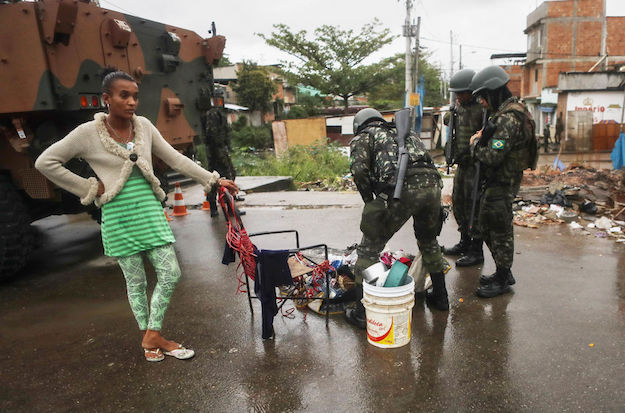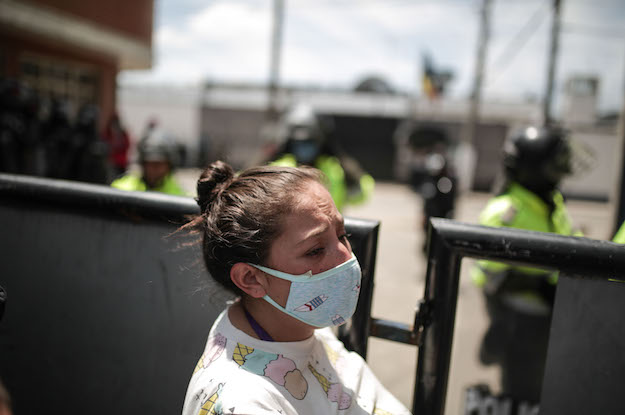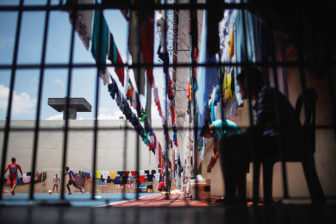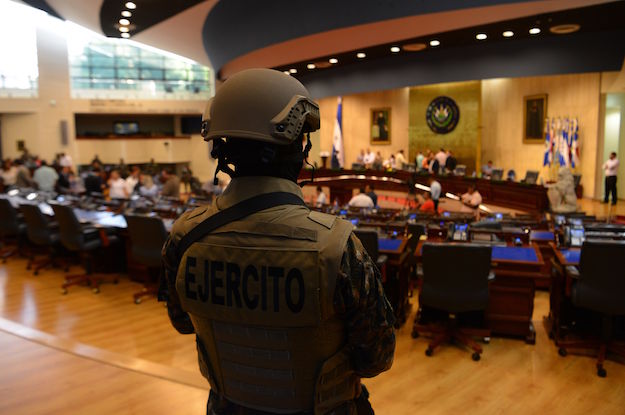Rio de Janeiro woke up with quite a hangover from this year’s carnival. On Friday, two days after the end of Brazil’s largest party, the federal government issued a decree placing the armed forces in charge of all security agencies. This was a reaction to skyrocketing criminal violence, and the first case of military intervention since the end of the military regime in 1985.
Yet, Rio has been plagued by organized crime, drug trafficking and violence for decades. What changed?
The immediate trigger for the intervention was a series of violent episodes during carnival, which laid bare the fragilities afflicting Rio’s day-to-day security toolbox. Several favelas registered gunfights, three military police officers died, and images of a group of young men robbing and beating sunbathers on Ipanema beach were broadcast far and wide. The sense of despair was acute. Cariocas, as Rio residents are known, contrasted the aggressive and growing organized crime underworld and the retreating, degraded state of its law enforcement. The real root of the intervention is this deterioration of institutional capacities to implement security and development policies in a complex megacity – and this needs more than the quick fix of military intervention.
Securing Rio was never easy. The metropolitan area has 12.5 million inhabitants, with a hilly geography affected by rapid and unmanaged urbanization during the second half of the 20th century. Now, the demise of the security strategy implemented prior to the World Cup and Olympic Games, combined with a massive budget shortfall linked to Brazil’s economic recession, collapsing oil prices, and the Rio state government’s mismanagement, has left a dangerous vacuum of funding and public policy that is being translated into escalating violence across the state.
The first element in this deadly equation, organized crime, has been a long-standing challenge for Rio, but it has become less stable in recent years. The declining state of Rio’s police forces and their reduced ability to enforce presence in former gang territories has encouraged Rio’s gangs to re-occupy favelas and other marginalized areas that had been their traditional turf before the pacification strategy. On top of that, Rio is currently a battleground for the Rio-based CV gang, and groups backed by its São Paulo-based rival, PCC, a powerful organized-crime group operating in South America. This has given Rio first-hand experience with one of Latin America’s greatest urban policy dilemmas: How can democracies respond to well-armed, transnational and generally well-organized drug-trafficking groups? Faced with this challenge, the traditional tools for urban security have been exposed as insufficient.
Police are also part of the problem: 67 percent of cariocas fear rather than trust Military Police officers, who are responsible for dealing with street crime. There’s good reason for that mistrust, as Rio’s police killed 1,124 people across the state in 2017, an increase of 21 percent over the previous year. Corruption is also an issue. In June 2017, Rio authorities issued arrest warrants for 96 Military Police officers accused of receiving large sums for protecting the CV gang. According to a report by O Globo, a Rio-based newspaper, police corruption was as important a reason as street violence for the military intervention; in fact, it wrote that the “cleanup” of the police is considered “the most difficult part of the federal intervention.”
At the same time, funding shortfalls have undermined what effectiveness this police force could muster. In 2017, the Military Police had to lay off 2,000 officers; half of its patrol vehicles are out of service for lack of maintenance, and yet the force suffered another 10 percent budget cut for 2018. Even the Pacifying Police Units (UPP) program, which brought permanent police presence to favelas previously controlled by gangs, and which garnered significant political and budgetary support since its inception in December 2008, went from getting 5.4 million reais ($1.67 million dollars) for upkeep in 2017 to a paltry 10,000 reais in 2018.
Another important element in the security crisis is the persistent absence of public goods in many areas of the city, especially favelas. With policing dominated by a militarized force, the Brazilian state is left with few tools to implement a democratic security policy. This is why the decline and fall of the UPP strategy has been such a hard blow to the security of cariocas and, more profoundly, to their hope in the future.
For ten years, the UPP program supplied an inkling of hope. Whereas for decades the security approach (“strategy” would be too fancy a word for it) consisted of heavy-handed police raids into favelas to achieve a limited and temporary objective, under the UPP, security forces occupied gang-controlled areas, then followed up with a permanent and strong police presence. This paved the way for other public institutions and services, from rubbish collection and mail delivery to cable cars. Implementation was imperfect: the social development component was far less significant than originally planned, and often incongruent with community needs. Yet, according to official numbers from Rio’s Public Security Institute, between 2008 and 2014 homicides in UPP communities fell by 65 percent; across the city of Rio, the drop amounted to 42.5 percent.
By 2017, however, these gains were largely reversed. Rio registered 40 violent deaths per 100,000 inhabitants, the highest homicide rate since 2009. The number of deaths due to gunfights between gangs and the weakened police force tripled between 2013, the peak of the UPP program, and 2017.
Many political commentators have read the declaration of military intervention as a political maneuver by the deeply unpopular President Michel Temer. The possibility of scoring points with the population might have played a role in his decision-making, but reading the intervention this way is simplistic. Yes, the decision could help Temer (a bit). But without the widespread view that the situation in Rio is out of control, and that cariocas have few if any other options, this would not be possible. And indeed, a poll by Datafolha in October showed that 83 percent of Rio dwellers approved of the use of the armed forces in law enforcement duties there.
The problem is broader. Authorities in Rio and Brasília have not shown they understand the complexity and magnitude of the challenge. Otherwise, instead of military intervention we would have seen a profound and well-resourced reform of its troubled police, an ambitious and transparent plan for urban infrastructure investment in marginalized areas and a clear program (with the federal government and international partners) of socio-economic development. As it is, organized crime and corruption were left to expand, control favela territories and undermine hope to such an extent that many (though not all) cariocas have welcomed the announcement of military intervention.
An ambitious reform of its security sector and urban infrastructure remains the best bet for Rio in the medium term. The irony is that Rio was on the right track until a few years ago, with the pacification strategy. It was far from perfect, especially with the insufficient investment on the infrastructure and social development fronts. The soul-searching that Rio must conduct in the next few months should investigate which aspects of that strategy it wants to recover and which ones it wants to change. But something ambitious needs to be done. The solution to Rio’s security challenge is not quick or easy.
—
Antônio Sampaio is the Research Associate for Security and Development at the International Institute for Strategic Studies (IISS). He is a member of the Global Initiative against Transnational Organised Crime (GITOC) and writes frequently on urban security and organized crime.






